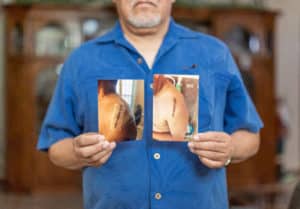José Oliva survived the bloodiest year in Vietnam, but he most feared for his life when he was brutally beaten in an unprovoked attack by federal officers in a Veterans Affairs hospital in his hometown of El Paso, Texas that left him with several injuries, two of which required surgery. On January 29, 2021, the Institute for Justice filed an appeal to the U.S. Supreme Court asking it to reverse the 5th Circuit decision that ruled federal officers—such as those in a VA hospital—may act with impunity and not be held accountable for their actions, no matter how unconstitutional.
“I feared for my life,” José said. “I survived the bloodiest year in Vietnam, and here I was fearing for my life as these officers beat and choked me in a VA hospital in my own hometown. It was three against one, and they had guns. I knew better than to resist.”
José is a native of El Paso, Texas and a Vietnam War vet, who served nearly three decades in law enforcement, and advocated on behalf of veterans in his hometown and nationwide.
In February 2016, federal police working as security at an El Paso VA hospital assaulted José as he was entering the hospital for a dentist appointment. As a result of the assault, José suffered an injured shoulder and neck, each of which required surgery, along with a ruptured ear drum. The officers charged José with disorderly conduct—a charge that was dismissed.
When José sued the officers, a predictable thing happened. The officers invoked qualified immunity—a controversial doctrine that the Supreme Court invented in 1982 to protect government workers from being sued for unconstitutional conduct. The district court denied the officers qualified immunity. The 5th Circuit, however, agreed with the officers and reversed the district court, holding that even if qualified immunity were not available, José still can’t sue because he was assaulted by federal—and not state—officers.
“This decision is wrong,” said IJ Attorney Anya Bidwell. “Federal officials are not above the Constitution. The 5th Circuit’s decision disregards Supreme Court precedent and departs from the consensus of other courts of appeals that have considered this same issue. As a result, Texas, Louisiana and Mississippi are now constitution-free zones, as far as federal police are concerned. And there are more than 17,000 federal police who work within the jurisdiction of the 5th Circuit.”
The Institute for Justice is asking the Supreme Court to reverse the 5th Circuit’s decision and let the case proceed to trial.
“If the Fourth Amendment doesn’t protect a 70-year-old veteran beaten by federal police inside a veterans’ hospital for no reason, it doesn’t protect anyone,” said Patrick Jaicomo, an attorney with the Institute for Justice, which represents José.
IJ President Scott Bullock said, “IJ, through our Project on Immunity and Accountability, seeks to ensure that the Constitution serves to limit the government in fact, not just in theory, and that promises enshrined in its Bill of Rights are not empty words but enforced guarantees.”
Jaicomo said, “The Supreme Court will have to decide which court was right in José Oliva’s case: the trial court that ruled the officers should have known they couldn’t beat and choke a veteran in an unprovoked attack, or the 5th Circuit, that ruled that it didn’t matter and the officers cannot be held to account for their actions, thus fully immunizing the federal officers. For the sake of every veteran who goes into a VA facility, José hopes the Supreme Court accepts his case and finds in his favor.”
José’s petition further asks the Court to call for the view of the U.S. Solicitor General. With the new administration in office, it will be important for the Court, as well as the rest of the nation, to know where the chief appellate lawyer for the federal government stands on the issue of accountability for federal police.
As a former law enforcement officer, José’s goal in bringing this lawsuit is to ensure that other law enforcement officers respect the Constitution. When rogue law enforcement agents are allowed to violate the Constitution without consequence, the reputations of good law enforcement officers suffer.
This article was originally featured at the Institute for Justice and is republished with permission.
































